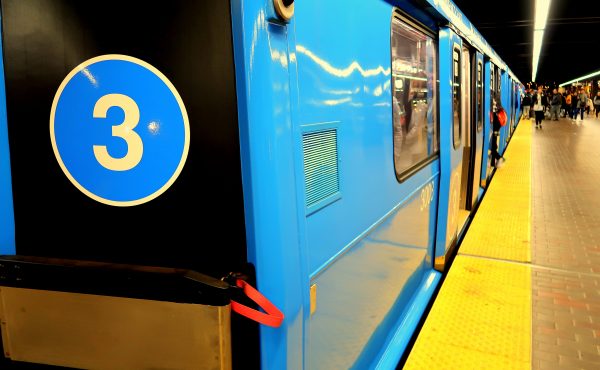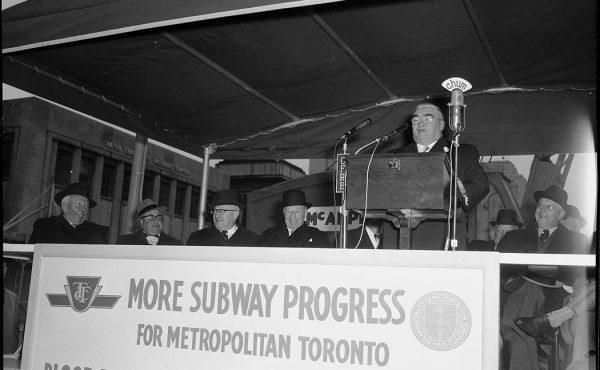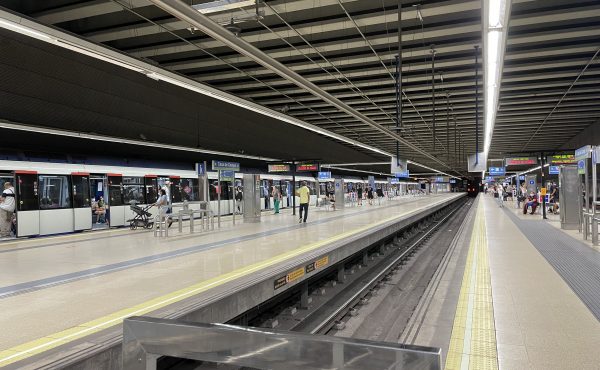
(This is a map of potential TTC service cuts by Ian Trider via the Torontoist. Solid red lines are routes which may be entirely eliminated. Broken red lines are routes which may be eliminated, but partially serviced by other routes. The yellow lines are routes which may have their service reduced. Click here to see a larger-size version.)
WHAT: Public consultation on potential TTC cuts
WHEN: Monday, September 10 @ 7pm
WHERE: Scarborough Civic Centre (150 Borough Drive), Rotunda
WHAT: Special TTC funding crisis meeting
WHEN: Wednesday, September 12 @ 10am
WHERE: City Hall (100 Queen Street West), Committee Room 1
The TTC will be participating in a public consultation regarding service cuts tonight at the Scarborough Civic Centre. TTC Chair Adam Giambrone, TTC Chief General Manager Gary Webster and City Councillor Michael Thompson will be in attendance.
They will also be holding a special meeting at City Hall on Wednesday to discuss the TTC’s response to the City’s current financial crisis.
As you can see from the map above (or from the TTC version), the TTC is proposing massive service cuts to over 50 of their current routes. This will irrevocably damage the network of buses, streetcars and subways that Torontonians use every day to access everything from employment and education to public services.
Often, public transit in Toronto is discussed in terms of how it relates to urban planning, environmentalism or gridlock. Rarely do you hear it discussed in terms of the importance it plays in maintaining the social fabric of the city. Public transit creates a sense of connection to the greater whole, and that sense of inclusion is tremendously empowering. You cannot just eliminate a person’s ability to get to work, buy groceries or go to school! That’s as ludicrous as cutting off their access to water or hydro.
But why is public transit treated as though it is expendable? Why is it not treated as an essential service?
Gutting the network is a violation of every Torontonian’s (regardless of whether you use the TTC or not) fundamental right to basic access and basic mobility.
This is not just about a bus route being cut here, or someone having to wait an extra 20 minutes for a ride, or someone having to buy a car to pick up their kids from daycare.
It’s about what kind of city you want: Toronto the OK or Toronto the Great?




5 comments
I’m conflicted about this process as I’m feeling we’re being played somewhat for larger politricks. Of course the City’s being beggared a bit by other governments, of course we need more money, but did nobody in power see this crisis coming? And why aren’t we deep-sixing the Spadina subway extension because we can’t afford another subway to sprawl, despite it being Mr Sorbara’s pet project (or so it seems).
comments to gso@ttc.ca if one can’t go to the meeting; an email to a councillor is councillor_lastname@toronto.ca
to find out who your councillor is – 416-338-0338
Is there a TTC page where these meetings are announced (too much to hope for that there would be an RSS feed I guess)? I never seem to hear about them except right before they happen when Spacing or TT or Steve Munro put the word out. It seems to me that the City frequent trumpets consultation when it has little intention of having people know they should turn up, let alone listen to what they have to say.
Mark,
The Public Consultations page on Torontopedia is meant to do exactly that: list each and every public consultation in the City. The orange RSS feed icon is in the top right of your browser’s navigation bar, bookmark that and you’re set.
Hamish,
There is a difference between the capital budget and the operating budget. Like it or not, that is the nuance that comes up again and again when one asks how can the TTC both be expanding and contracting at the same time. There is money to building new things, there is less money to keep them funding once they get going. Core Funding is the question of the day.
I was in Scarborough at the Public Consultation last night. At peak, there were about 150 people in council chambers watching and talking about how the TTC should proceed. I was third or fourth at the mic and my comments kinda rippled throughout the comments that followed either for or against my proposals.
It was obvious by night’s end, This public consultation was not about getting genuine creative new ideas from the public, of which more than half of the speakers last night were doing, it was simply to reinforce the choices to be discussed at Wednesday’s TTC meeting, and nothing more.
The TTC is the canary in the coal mine that is the City of Toronto.
Last night, we told the five Councillors present that without “Out of the Box Thinking” as the night’s first speaker said, sorry, that canary ain’t just taking a nap.
HiMY – have got that, thanks. Didn’t know that was out there.
As for cap vs operating, “There is money to building new things, there is less money to keep them funding once they get going. Core Funding is the question of the day.” Well, that’s one question. Aborting capital projects with shovels in the ground is often throwing more money away than the operating expense justifies.
The other question is why Toronto proceeds with *new* capital project planning like Spadina Extension when there isn’t enough money to pay for it on the operating side. I note Sandra Bussin has now questioned the extension. Greg Sorbara should be told to break the Spadina trust open and spend the money elsewhere because our operating budget is not going to be weighed down by a project when Toronto, under the current contract, bears the cost of operating losses.
I’m aware that there are differences between capital and operating yet many of us wouldn’t proceed with a large project or five when some things were worn out or needing repair, or inefficient. Yet that’s what the civic collective seems to be doing, the Sorbara subway being one example, the Front St. Extension and its Metro-era companion, the WWLRT.
And yes, I do agree, the consults were most likely NOT wanting to get new ideas – trying to get a few transit options instead of a harmful costly road has so far been a five year effort.
I’m glad you trekked to Scarborough though.